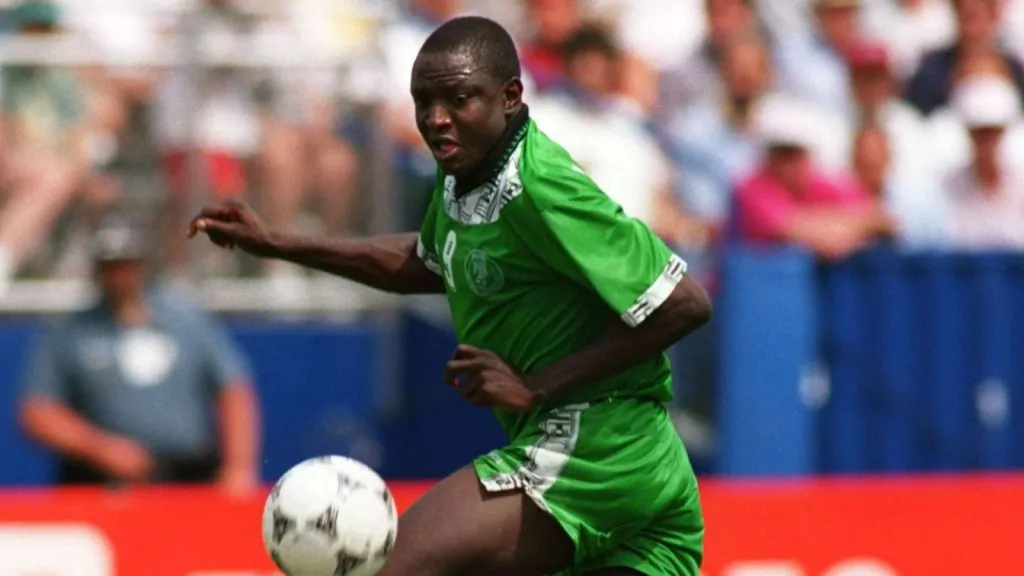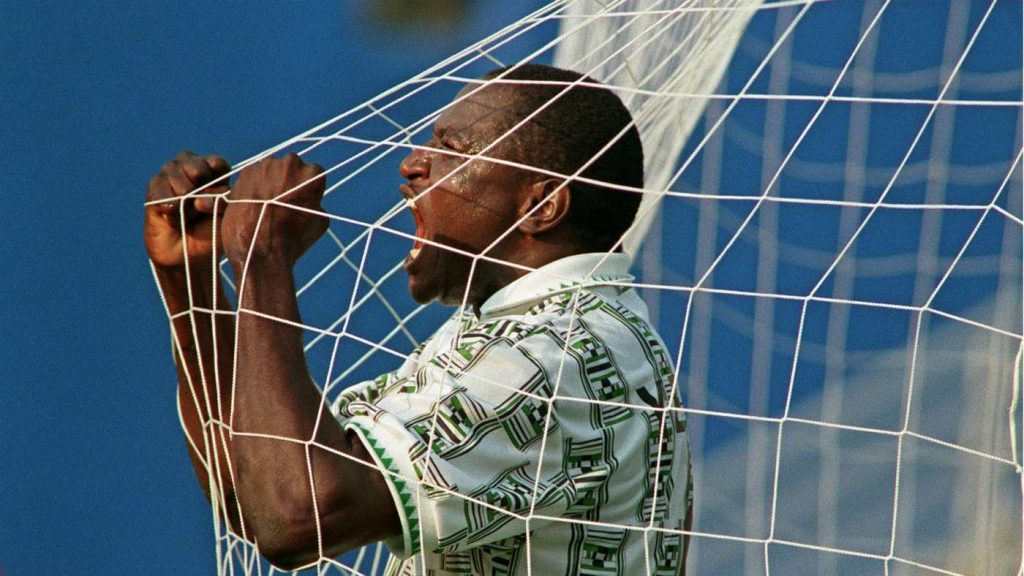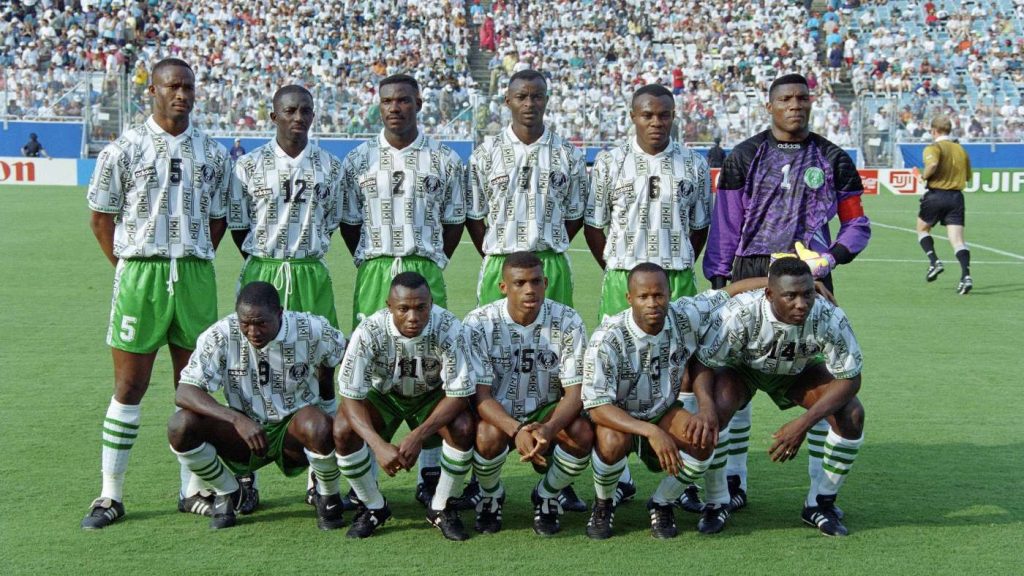
On the day that the Super Eagles’ all-time marksman would have turned 57, Goal pay tribute to the Bull of Kaduna
It’s rare that a goal celebration proves to be more iconic than what precedes it; yet, Rashidi Yekini’s outpouring of emotion after scoring Nigeria’s first against Bulgaria in 1994 was a shift from the norm. The Super Eagles’ number nine had just netted the West African nation’s first-ever World Cup goal, a feat that’ll never be erased from the history books.
The goal itself was a tap-in from about three yards, after Daniel Amokachi spotted and played in Finidi George wide right behind the European nation’s defence, before the wideman moved infield and squared to the forward to score.
To date, observers still haven’t made out what the late striker bellowed while vigorously shaking the net at the Cotton Bowl, still we all got the gist of his celebration.
After his heroics at the Africa Cup of Nationsabout three months before the global showpiece, it was only fitting for Yekini to be the man to create a bit of Nigerian history in the United States.
The Vitoria de Setubal icon netted five times in Tunisia to top the scoring charts, and was deservedly named the competition’s best player. While Ivory Coast’s Joel Tiehi came second with four, the next set of scorers – which included Emmanuel Amunike – scored twice, truly highlighting Yekini’s prolific goalscoring at the finals.
Having fallen short in 1984, 1988 and 1990 since their 1980 Afcon success, Nigeria’s main striker was essential in bringing the coveted trophy back to the nation since they won it on home soil, thus ending a frustrating 14-year wait.

While the timely nature of Amunike’s pair of goals at the finals remains appreciated (the attacker scored a brace in the 2-1 turnaround in the decider against Zambia), the Super Eagles’ top striker’s impact in their run to the final, and especially in the knockout rounds, was noteworthy: Yekini followed up his two goals in a 3-0 group stage success over Gabon with a brace in the quarter-final clash with Zaire (now the Democratic Republic of Congo), a 2-0 win.
He then followed that up with another strike in the nerve-racking semi-final success over Ivory Coast. Nigeria twice came from behind against their West African rivals, with the joint top scorer pulling ahead of Tiehi by making it 2-2.
After the Elephants capitulated in the shoot-out, Yekini was the one whose composure from 12 yards sent the Super Eagles into their fourth final since 1984, which they finally won after finishing runners-up three times.
Yekini had actually featured in the final defeats in ’88 and ’90 by Cameroon and Algeria respectively, so victory in Tunisia will have tasted sweeter for the frontman.
Still, the forward had Amunike to thank for not being a three-time losing Afcon finalist. Nigeria’s previously reliable number nine was unusually profligate in the final against the Copper Bullets, missing no less than three clear-cut chances, while he had an effort from a tight angle cleared off the line.

Even though he was mostly wasteful and slightly unlucky in the final, he proved more than a handful for the Zambia defence with his hold-up play and power, particularly difficult to deal with.
In the end, like Segun Odegbami (who ended joint-top scorer with three goals in 1980), Yekini was Nigeria’s highest scorer 14 years later.
It was to prove somewhat prescient that the latter supplanted the former as the Super Eagles’ top scorer, ending his international career with 37 goals. Odegbami’s tally was 22. The departed icon remains the West Africans’ highest scorer with his tally still unassailable after two decades.
The forward’s pioneering impact for football in the country saw him named African Footballer of the Year in 1993, which heralded a period of success in the 1990s. Amunike (1994), Nwankwo Kanu (1996 and 1999) and Victor Ikpeba (1997) claimed the coveted award in the 90s, while Okocha ended runner-up in ’98.
Tellingly, Nigeria’s dominance hasn’t been sustained in the 21st century with the nation without a winner since Kanu’s ‘99 feat.
Yekini, though, foreshadowed that abundant spell for the country which forever cements his place as one of the country’s greats, and arguably the greatest.
At club level, he excelled for Vitoria Setubal in the early 90s, for whom he scored an wealth of goals between 1990 and 1994.
This culminated in Yekini ending top scorer in the 93/94 Primeira Liga campaign with 21 goals, taking the league’s new boys to a sixth-place finish in their first season back in the top flight.
For a bit of perspective, no player from the club has won the Bola de Prata since, with stars from majorly Porto and recently Benfica dominating the top scorer’s award.
Despite struggling to sustain his form after leaving the Portuguese league at 31, the 1994 Afcon champion will be remembered as one of Africa’s great forwards.
Interestingly, Yekini never scored another World Cup goal after that opener against Bulgaria, a surprising statistic in itself.
That, and his understandable decline in his 30s, showed he was only human. However, in his pomp, the Nigerian icon’s revolutionary impact on the continent and on the world stage eternally remains intact.
source:- goal
Now Playing: Love Bug
Aretti Adi
SPONSORED LINKS
LOAN FOR TRAVEL, VISA, JAPA, PoF UP TO N200M (CLICK HERE)
[CLICK HERE] For Music Artwork, Website Design And SEO Setup
INSTALL 9JAFLAVER MUSIC APP, STREAM, DOWNLOAD, AND PLAY MUSIC OFFLINE
CHECK OUT FUNNY PICTURE AND MEME HERE (CLICK HERE)
Chissom Anthony – Glory To God In The Highest [See Trending Gospel Song]
Copyright © 2014-2026 9jaflaver. All Rights Reserved.
About us | DMCA | Privacy Policy | Contact us
| Advertise| Request For Music | Terms Of Service
9jaflaver is not responsible for the content of external sites.